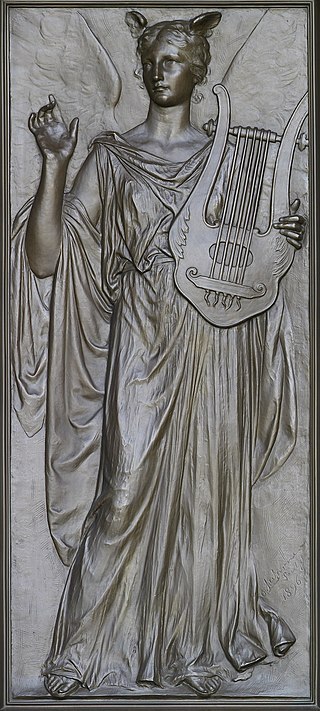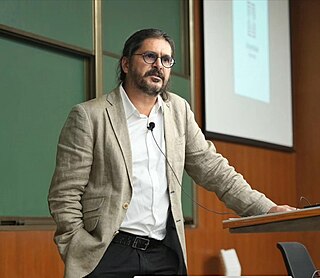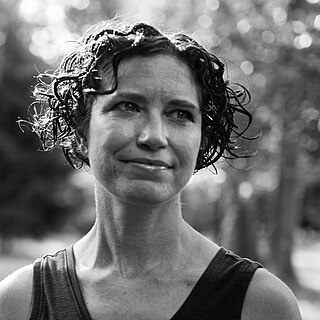
Ellas Otha Bates, known professionally as Bo Diddley, was an American guitarist and singer who played a key role in the transition from the blues to rock and roll. He influenced many artists, including Buddy Holly, Elvis Presley, the Beatles, the Rolling Stones, the Animals, George Thorogood, Syd Barrett, and the Clash.

In Buddhism, Buddha, "awakened one", is a title for those who are spiritually awake or enlightened, and have thus attained the supreme religious goal of Buddhism, variously described as nirvana, awakening (bodhi) and liberation (vimutti). A Buddha is also someone who has fully understood the Dharma, the true nature of things or the universal law. Buddhahood is the condition and state of a buddha. This highest spiritual state of being is also termed sammā-sambodhi. This state is interpreted in many different ways in the various schools of Buddhism.

Yogachara is an influential tradition of Buddhist philosophy and psychology emphasizing the study of cognition, perception, and consciousness through the interior lens of meditation, as well as philosophical reasoning (hetuvidyā). Yogachara was one of the two most influential traditions of Mahayana Buddhism in India, along with Madhyamaka.
The relationship between Buddhism and science is a subject of contemporary discussion and debate among Buddhists, scientists, and scholars of Buddhism. Historically, Buddhism encompasses many types of beliefs, traditions and practices, so it is difficult to assert any single "Buddhism" in relation to science. Similarly, the issue of what "science" refers to remains a subject of debate, and there is no single view on this issue. Those who compare science with Buddhism may use "science" to refer to "a method of sober and rational investigation" or may refer to specific scientific theories, methods or technologies.
Mark L. Johnson is Knight Professor of Liberal Arts and Sciences in the Department of Philosophy at the University of Oregon. He is known for contributions to embodied philosophy, cognitive science and cognitive linguistics, some of which he has coauthored with George Lakoff such as Metaphors We Live By. However, he has also published on philosophical topics such as John Dewey, Immanuel Kant and ethics.

Dharmakīrti, was an influential Indian Buddhist philosopher who worked at Nālandā. He was one of the key scholars of epistemology (pramāṇa) in Buddhist philosophy, and is associated with the Yogācāra and Sautrāntika schools. He was also one of the primary theorists of Buddhist atomism. His works influenced the scholars of Mīmāṃsā, Nyaya and Shaivism schools of Hindu philosophy as well as scholars of Jainism.

Dhyāna in Hinduism means contemplation and meditation. Dhyana is taken up in Yoga practices, and is a means to samadhi and self-knowledge.

Shaun Gallagher is an American philosopher known for his work on embodied cognition, social cognition, agency and the philosophy of psychopathology. Since 2011 he has held the Lillian and Morrie Moss Chair of Excellence in Philosophy at the University of Memphis and was awarded the Anneliese Maier Research Award by the Humboldt Foundation (2012–2018). Since 2014 he has been Professorial Fellow at the University of Wollongong in Australia. He has held visiting positions at Keble College, Oxford; Humboldt University, Berlin; Ruhr Universität, Bochum; Husserl Archives, ENS (Paris); École Normale Supérieure, Lyon; University of Copenhagen; and the Cognition and Brain Sciences Unit, Cambridge University. He is also known for his philosophical notes on the effects of solitary confinement.

Anecdotal cognitivism is a method of research using anecdotal, and anthropomorphic evidence through the observation of animal behaviour.
Darwinian literary studies is a branch of literary criticism that studies literature in the context of evolution by means of natural selection, including gene-culture coevolution. It represents an emerging trend of neo-Darwinian thought in intellectual disciplines beyond those traditionally considered as evolutionary biology: evolutionary psychology, evolutionary anthropology, behavioral ecology, evolutionary developmental psychology, cognitive psychology, affective neuroscience, behavioural genetics, evolutionary epistemology, and other such disciplines.

Imagination is the production of sensations, feelings and thoughts informing oneself. These experiences can be re-creations of past experiences, such as vivid memories with imagined changes, or completely invented and possibly fantastic scenes. Imagination helps apply knowledge to solve problems and is fundamental to integrating experience and the learning process. As a way of building theory, it is called "disciplined imagination". A way of training imagination is by listening to storytelling (narrative), in which the exactness of the chosen words is how it can "evoke worlds".
Steven Mitchell Nadler is an American academic and philosopher specializing in 17th-century philosophy. He is Vilas Research Professor and the William H. Hay II Professor of Philosophy, and was Max and Frieda Weinstein-Bascom Professor of Jewish Studies at the University of Wisconsin–Madison. He is also director of their Institute for Research in the Humanities.
Elliot R. Wolfson is a scholar of Jewish studies, comparative mysticism, and the philosophy of religion.

Peter Carruthers is a British-American philosopher and cognitive scientist working primarily in the area of philosophy of mind, though he has also made contributions to philosophy of language and ethics. He is a professor of philosophy at the University of Maryland, College Park, an associate member of Neuroscience and Cognitive Science Program, and a member of the Committee for Philosophy and the Sciences.

Shaun Nichols is an American professor of philosophy at Cornell University specializing in the philosophy of cognitive sciences, moral psychology and philosophy of mind.
Lawrence Shapiro is a professor in the Department of Philosophy at the University of Wisconsin–Madison in the United States. His research focuses in the philosophy of psychology. He also works in both the philosophy of mind, and philosophy of biology.
Charles Taliaferro is an American philosopher specializing in theology and philosophy of religion. He is an emeritus professor of philosophy at St. Olaf College, a senior research fellow at the Institute for Faithful Research, and a member of the Royal Institute of Philosophy. He is the author, co-author, editor, or co-editor of twenty books, most recently The Image in Mind; Theism, Naturalism and the Imagination, co-authored with the American artist Jil Evans. He has been a visiting scholar or guest lecturer at a large number of universities, including Brown, Cambridge, Notre Dame, Oxford, Princeton, and the University of Chicago. Since 2013 Taliaferro is editor-in-chief of the journal Open Theology.

Jonardon Ganeri, FBA, is a philosopher, specialising in philosophy of mind and in South Asian and Buddhist philosophical traditions. He holds the Bimal Matilal Distinguished Professorship in Philosophy at the University of Toronto. He was Global Network Professor in the College of Arts and Science, New York University, previously having taught at several universities in Britain. Ganeri graduated from Churchill College, Cambridge, with his undergraduate degree in mathematics, before completing a DPhil in philosophy at University and Wolfson Colleges, Oxford. He has published eight monographs, and is the editor of the Oxford Handbook of Indian Philosophy. He is on the editorial board of the Stanford Encyclopedia of Philosophy, the British Journal for the History of Philosophy, Philosophy East & West, Analysis, and other journals and monograph series. His research interests are in consciousness, self, attention, the epistemology of inquiry, the idea of philosophy as a practice and its relationship with literature. He works on the history of ideas in early modern South Asia, intellectual affinities between India and Greece, and Buddhist philosophy of mind, teaches courses in the philosophy of mind, the nature of subjectivity, Buddhist philosophy, the history of Indian philosophical traditions, and supervises graduate students on South Asian philosophical texts in a cross-cultural context. He is a prominent advocate for an expanded role for cross-cultural methodologies in philosophical research, and for enhanced cultural diversity in the philosophical curriculum. Jonardon Ganeri is the inventor of the idea of "cosmopolitan philosophy" as a new discipline within philosophy.
Ann-Sophie Barwich is a cognitive scientist, an empirical philosopher, and a historian of science. She is an assistant professor with joint positions in the cognitive science program and the department of history and philosophy of science at Indiana University Bloomington. Barwich is best known for her interdisciplinary work on the history, philosophy, and neuroscience of olfaction. Her book, Smellosophy: What the Nose tells the Mind, highlights the importance of thinking about the sense of smell as a model for neuroscience and the senses. She is also noted for her analyses on methodological issues in molecular biology and neuroscience.

Mary-Jane Rubenstein is a scholar of religion, philosophy, science studies, and gender studies. At Wesleyan University, she is Professor of Religion and Science in Society. She is also affiliated with Environmental Studies and Feminist, Gender, and Sexuality Studies. From 2014 to 2019, she was co-chair of the Philosophy of Religion Unit of the American Academy of Religion. She is a Fellow of the International Society for Science and Religion.












